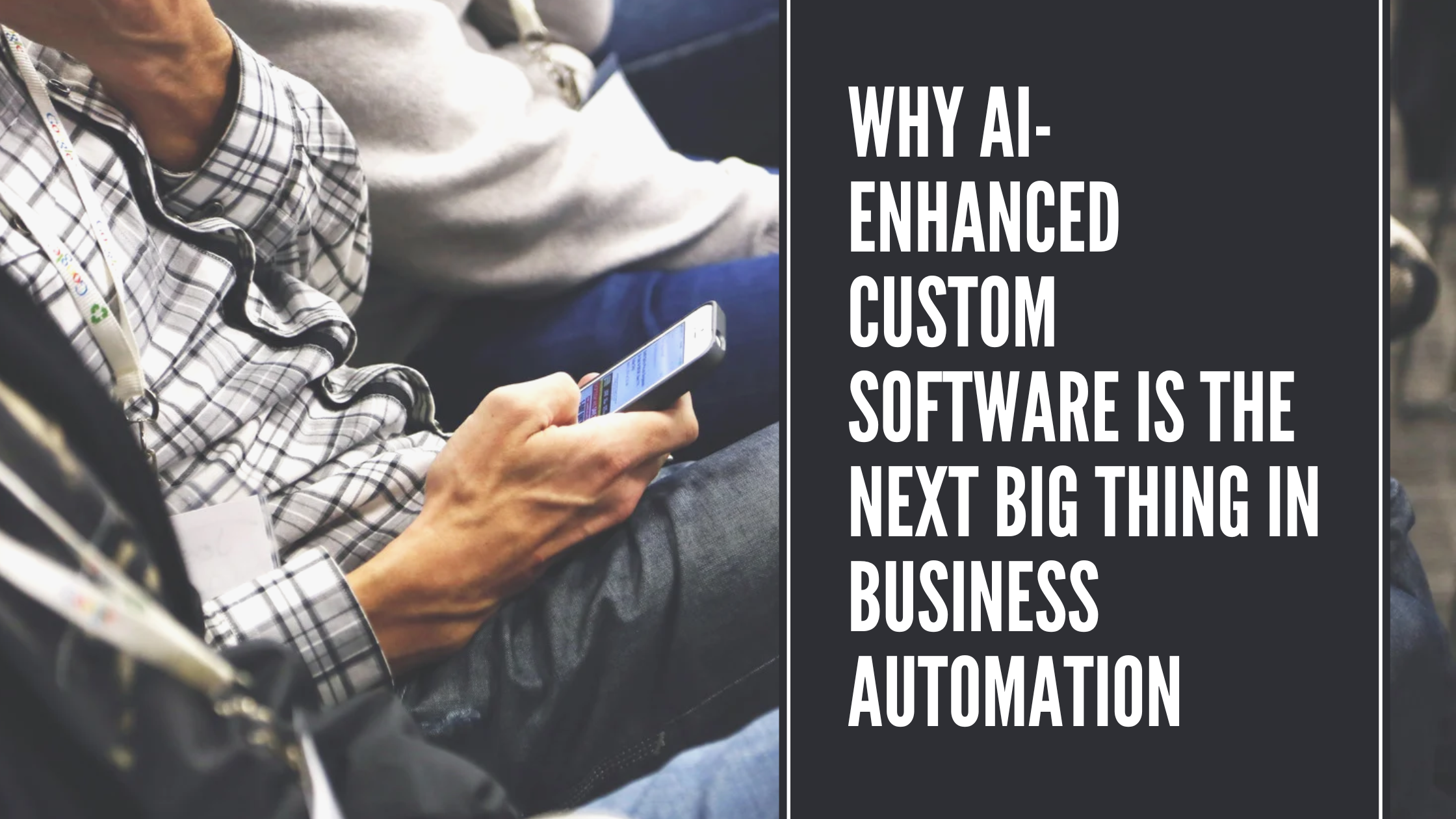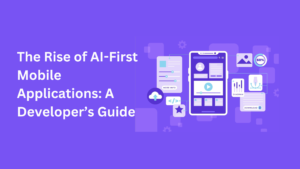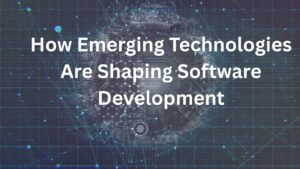Why AI-Enhanced Custom Software is the Next Big Thing in Business Automation
Introduction: The AI Revolution in Business Automation
We are living in an era where efficiency is king, and AI is the game-changer redefining how businesses operate. Automation is no longer just about reducing manual tasks—it’s about smart decision-making, predictive insights, and seamless integration across operations. And at the heart of this transformation? AI-enhanced custom software.
AI-driven automation is revolutionizing industries, helping companies scale faster, cut costs, and boost productivity. From real-time data analysis to intelligent workflows, AI-powered custom software is rapidly becoming a necessity rather than a luxury. Businesses that fail to adapt to this shift risk falling behind.
But why exactly is AI-enhanced custom software the “next big thing”? Let’s break it down.
How AI is Reshaping Custom Software Development
Custom software is built to fit a company’s specific needs. But traditional software, even when tailor-made, still relies on static rules and manual inputs. AI changes this equation by making software dynamic—learning, adapting, and optimizing processes on its own.
Here’s how AI is disrupting software development:
- Self-learning systems – AI-powered software continuously improves based on user interactions and real-world data.
- Automated code generation – Developers can rely on AI to generate, test, and refine code, accelerating development timelines.
- Predictive analytics – AI helps businesses anticipate market trends, equipment failures, and consumer demands before they happen.
- Process automation with intelligence – AI doesn’t just execute tasks; it understands context, making informed decisions in real time.
Custom software is no longer just about building digital tools—it’s about creating intelligent systems that think, learn, and evolve with your business.
The Business Case for AI-Enhanced Custom Software
Every company wants to be more efficient, more competitive, and more profitable. AI-powered software delivers on all three fronts.
1. Efficiency Gains: Work Smarter, Not Harder
Time is money, and AI saves plenty of both. Businesses spend countless hours on repetitive tasks—data entry, invoice processing, scheduling, customer support. AI automates these functions while improving accuracy, freeing up human talent for high-value tasks.
For example, AI-powered chatbots can handle customer inquiries 24/7, while AI-driven analytics can generate reports instantly—tasks that once required entire teams.
2. Cost Reduction Without Sacrificing Quality
Investing in AI-powered software might seem expensive at first, but the long-term cost savings are undeniable. AI reduces labor costs, minimizes errors, and optimizes resource allocation, ensuring businesses get maximum output with minimal input.
Consider the impact on IT operations alone—AI-driven monitoring tools detect system failures before they occur, reducing downtime and preventing costly disruptions.
3. Scalability: AI Grows with Your Business
Traditional software needs constant updates to keep up with changing business needs. AI-driven software, however, evolves on its own. It adapts to new challenges, learns from past interactions, and scales effortlessly as business demands increase.
A logistics company, for example, can use AI-powered software to analyze shipment data and automatically optimize delivery routes as order volumes change. The result? Faster deliveries, lower costs, and happier customers.
AI-Powered Automation: Transforming Key Business Functions
AI is not just a supporting tool—it’s redefining core business operations across industries. Let’s look at how AI-enhanced custom software is making an impact.
1. AI in Finance: Fraud Detection & Smart Accounting
Financial transactions generate massive amounts of data. AI-driven software can analyze patterns, flag unusual transactions, and prevent fraudulent activities in real time.
AI also simplifies accounting, automating invoice processing, reconciling statements, and predicting cash flow trends, reducing human errors and improving financial accuracy.
2. AI in HR & Recruitment: Smarter Talent Management
Hiring and managing employees has always been a time-intensive process. AI-powered HR software scans resumes, matches candidates with job descriptions, and even assesses emotional intelligence through facial recognition technology in video interviews.
Once hired, AI-driven HR tools help with employee engagement, scheduling, and performance evaluations—improving workforce productivity across the board.
3. AI in Healthcare: Faster Diagnoses & Personalized Treatment
From AI-driven diagnostics to robotic-assisted surgeries, AI-powered custom software is transforming healthcare. Machine learning algorithms can detect diseases from medical scans faster than human doctors, improving patient outcomes.
Custom AI software is also being used to tailor treatments based on patient history, optimizing medication plans and reducing side effects.
4. AI in Retail: Personalized Shopping & Smart Inventory Management
E-commerce giants like Amazon have set a high bar for personalized shopping experiences. AI-driven recommendation engines analyze customer behavior, offering personalized product suggestions that drive sales.
On the backend, AI optimizes inventory management by predicting demand fluctuations, ensuring businesses stock the right products at the right time.
Overcoming AI Implementation Challenges
Despite its advantages, AI-powered software development is not without hurdles. Companies must address these challenges to fully leverage AI-driven automation.
1. Data Privacy & Security Concerns
AI systems rely on vast amounts of data, making security a top priority. Businesses must implement robust data protection measures and comply with regulations like GDPR to ensure customer information remains secure.
2. The AI Learning Curve
Adopting AI-enhanced software requires businesses to train employees on how to use these new systems effectively. Resistance to change is a common challenge, but proper onboarding and education can ease the transition.
3. Avoiding AI Bias & Ensuring Ethical Use
AI systems are only as unbiased as the data they learn from. Businesses must ensure their AI models are trained on diverse datasets to prevent discriminatory decision-making. Transparency in AI decision processes is also essential for building trust.
The Future of AI in Business Automation
AI-powered custom software is not a passing trend—it’s the foundation of future business operations. Here’s what’s next in AI-driven automation:
- Self-learning AI models – Future software will become even more autonomous, requiring minimal human intervention.
- AI-driven cybersecurity – As cyber threats evolve, AI-powered security solutions will proactively defend against attacks in real time.
- Voice & gesture-based AI interfaces – The rise of voice assistants and AR/VR technologies will redefine user interactions with software.
As AI continues to advance, businesses that embrace AI-driven automation today will be the industry leaders of tomorrow.
Conclusion: AI-Powered Custom Software is the Future of Business Efficiency
The digital landscape is shifting, and AI-enhanced custom software is leading the charge. From intelligent automation to predictive analytics, AI is transforming how businesses operate—making them faster, smarter, and more efficient.
Organizations that invest in AI-powered automation will gain a significant edge over competitors, unlocking new levels of growth and innovation. The question isn’t whether AI will reshape business automation—it’s whether your business will be part of the transformation.
For those ready to integrate AI into their custom software solutions, software development services in California are paving the way, offering cutting-edge solutions tailored to modern business needs.
AI isn’t just enhancing business automation—it’s redefining it. The future is here. The only question is, are you ready?




